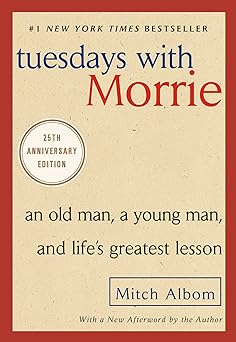It is our first class together, in the spring of 1976. I enter Morrie’s large office and notice the seemingly countless books that line the wall, shelf after shelf. Books on sociology, philosophy, religion, psychology. There is a large rug on the hardwood floor and a window that looks out on the campus walk. Only a dozen or so students are there, fumbling with notebooks and syllabi. Most of them wear jeans and earth shoes and plaid flannel shirts. I tell myself it will not be easy to cut a class this small. Maybe I shouldn’t take it.
How far out the door was I? Halfway. What if I had dropped the course? My life would be 100% different. I always tell this to people: on such small things in life, your whole world can change. If I had left, I’d be down the hall and he’d be calling for Albom? Albom? Bueller? And instead, out of guilt, I kind of slid back in and I raised my hand. You’ve heard the expression, “life can turn on a dime.” It did in that moment, and again when I saw Morrie on television.
Ginna and 206 other people liked this


